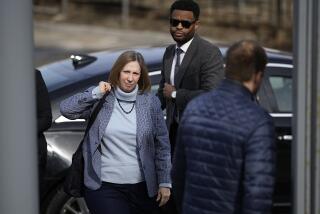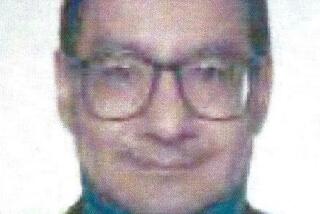Milan Miskovsky dies at 83; onetime CIA lawyer handled high-profile prisoner negotiations
Milan C. “Mike” Miskovsky, a onetime CIA lawyer who quietly worked behind the scenes in high-profile prisoner negotiations and also investigated the causes of racial turmoil in the 1960s, died Oct. 15 of lung cancer at his home in Washington. He was 83.
Miskovsky’s varied career began when he was a forester in the western United States and took him to flash points of the Cold War and civil rights movement. He negotiated a prisoner exchange that freed U-2 spy plane pilot Francis Gary Powers and helped arrange the release of Cuban Americans captured during the 1961 Bay of Pigs invasion. He later directed an inquiry into the underlying causes of racial unrest for the National Advisory Commission on Civil Disorders, better known as the Kerner Commission.
On May 1, 1960, Powers’ high-altitude U-2 spy plane was shot down over the Soviet Union. He ejected from the aircraft and was captured on the ground. After recovering cameras and film from the crash site, Soviet authorities interrogated Powers for several months before sentencing him to 10 years in prison for espionage.
As a CIA officer, Miskovsky was careful not to deal directly with Soviet representatives, so he hired New York lawyer James Donovan to handle face-to-face negotiations. Powers was released in dramatic fashion Feb. 10, 1962, when he walked across Berlin’s Glienicke Bridge and met U.S. officials on the other side.
In exchange, a British-born Soviet spy known as Rudolf Abel, who had been convicted of espionage in New York in 1957, walked across the bridge from the other direction, passing Powers in the middle. Reporters dubbed the Glienicke the “Bridge of Spies.”
In April 1961, after more than a year of planning by the CIA, a 1,400-man force of Cuban American exiles called Brigade 2506 launched an ill-fated invasion of their homeland, with the intent of unseating Fidel Castro. They landed at the Bay of Pigs on Cuba’s southern coast but were quickly routed by the Cuban military. More than 100 members of Brigade 2506 were killed, and nearly 1,200 were captured.
Miskovsky, whose role in the negotiations has been documented in several histories of the Cold War, worked closely with U.S. Atty. Gen. Robert F. Kennedy and, once again, with Donovan to arrange the Bay of Pigs prisoners’ release. In return for more than $50 million in baby food, pharmaceuticals and humanitarian aid, the captives were set free in December 1962.
In 1967, after riots devastated several U.S. cities, President Lyndon B. Johnson convened a commission led by the Democratic governor of Illinois, Otto Kerner Jr., to examine the causes of social unrest. Miskovsky, then working at the Treasury Department, directed the commission’s investigation, interviewing the Rev. Martin Luther King Jr. and other civil rights leaders.
Milan Carl Miskovsky was born May 11, 1926, in Chicago and graduated from the University of Michigan, where he also received a master’s degree in forestry in 1949. He spent two years with the U.S. Forest Service in Idaho, Montana and Washington state before being transferred to the District of Columbia in 1951.
He was quickly hired by the CIA as an analyst of forestry resources in the Eastern Bloc. After graduating from George Washington University law school in 1956, he joined the CIA’s legal office, eventually becoming the agency’s assistant general counsel.
Miskovsky left the CIA in 1964 and worked at the Federal Maritime Commission and Treasury Department before becoming director in 1968 of the Lawyers’ Committee for Civil Rights Under Law, which provides legal help to victims of civil rights abuses.
After a stint in private practice, he was general counsel to the Federal Home Loan Bank Board during the Carter administration.
From 1981 until his retirement in 2003, he was in private practice, most recently at Kirkland and Ellis, where he specialized in environmental and energy law.
His wife of 52 years, Anne Grogan Miskovsky, died in 2004.
Survivors include six children, Peter Miskovsky of Hedgesville, W.Va., Michael Miskovsky of Arlington County, Va.; and Anne Cekuta, Mark Miskovsky, Ellen Kentz and Thomas Miskovsky, all of Washington, D.C.; a brother; a sister; 14 grandchildren; and two great-grandchildren.
Schudel writes for the Washington Post.
More to Read
Start your day right
Sign up for Essential California for the L.A. Times biggest news, features and recommendations in your inbox six days a week.
You may occasionally receive promotional content from the Los Angeles Times.






